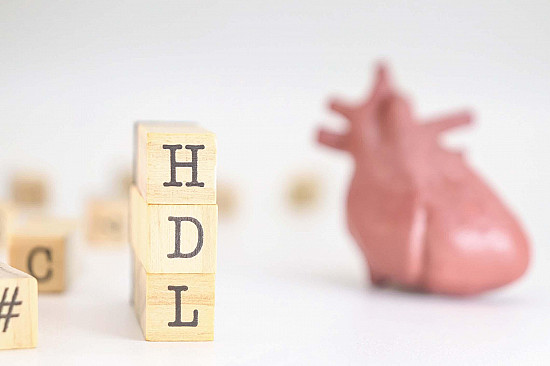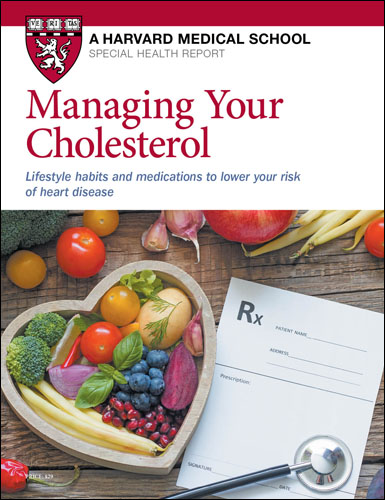Tips to help you stay on your cholesterol drug
Low-dose or alternate-day medication schedules and gentle muscle stretches can help.

Statin drugs such as atorvastatin (Lipitor) and rosuvastatin (Crestor) are important medications that reduce high LDL ("bad") cholesterol and significantly lower the risk for heart attack, stroke, or premature death. Despite the drugs' effectiveness, many people who start a statin discontinue its use.
"It's often cited that 50% of people, a year after starting a statin, are no longer taking it. I find it hard to believe it's that high. But it may be in the range of a quarter to half of people taking statins stop them," says Dr. Christopher Cannon, a cardiologist at Harvard-affiliated Brigham and Women's Hospital.
Statin nonadherence
Statins are often abandoned because of side effects (real or perceived). These can include muscle aches and cramps, an increase in blood sugar, an increased risk for diabetes in people already at high risk for the disease, heartburn, nausea, and in rare cases, liver problems or a potentially life-threatening breakdown in muscle cells that causes kidney damage.
Dr. Cannon says that in blinded studies, about 5% of statin users experience side effects as a result of an intolerance to the drug, and another 10% experience symptoms that they attribute to the medicine, but which are not actually caused by it. This phenomenon, called the "nocebo" effect, was reflected in a small, randomized trial published Sept. 21, 2021, in the Journal of the American College of Cardiology. Participants followed for one year reported almost as many side effects when they took a placebo (a fake treatment) as when they took a statin.
"People have negative expectations because, unfortunately, there's a lot of false information about statins on the Internet and social media. An example is the claim of cognitive decline as a side effect, which has been disproven several times over," Dr. Cannon notes.
What you can do
Work with your doctor to see if the following approaches can help you stick with your statin.
Start slowly. Consider a low-dose or an alternate-day-dose strategy to ease into statin use. "This recalibrates expectations and gives people more of an open mind that they can tolerate the statin," Dr. Cannon says.
Try a non-statin cholesterol drug. These drugs don't cause muscle aches the way statins sometimes do. Examples include cholesterol absorption inhibitors such as ezetimibe (Zetia) and bempedoic acid (Nexletol).
Think about other causes of muscle aches. Is it really the medication causing discomfort, or did you perhaps begin to exercise more when you started the statin, and you have sore muscles as a result?
Consider drug interactions. Some medications can cause adverse reactions when taken with statins, such as certain calcium-channel blockers, including diltiazem (Cardizem), and certain antifungal medications, such as ketoconazole (Nizoral).
Work with your doctor to pinpoint symptom causes. "Sometimes we stop the statin for a month and see if they feel better. Then we start the statin again to see if symptoms come back," Dr. Cannon says.
Take coenzyme Q10. This supplement has mixed results for relieving muscle aches from statins, but Dr. Cannon says it's worth a try. "You can take it and see if it helps. If it doesn't, stop taking it," he suggests.
Check your vitamin D levels. "There's an association between low vitamin D levels and higher muscle aches when you take a statin," Dr. Cannon says. "You'll want to replenish your vitamin D levels if they're low, but no study shows taking vitamin D will relieve aches."
Try gentle stretching. If you're experiencing muscle aches, a program of gentle stretching for all of your muscles (after marching in place or walking for a few minutes) can help. Make it a regular part of your day.
Whatever the cause of the symptoms you may feel when taking statins, work with your doctor to find a solution. "Working together is most important," Dr. Cannon says. "Patients need options, and we need to test things out together."
Want more information?Check out the Harvard Special Health Report Managing Your Cholesterol: /mc |
Image: © Fly View Productions/Getty Images
About the Author

Heidi Godman, Executive Editor, Harvard Health Letter
Disclaimer:
As a service to our readers, Harvard Health Publishing provides access to our library of archived content. Please note the date of last review or update on all articles.
No content on this site, regardless of date, should ever be used as a substitute for direct medical advice from your doctor or other qualified clinician.
















